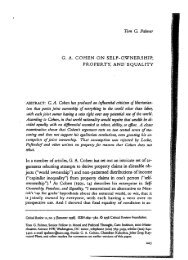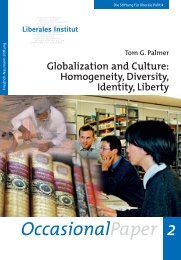Are Patents and Copyrights Morally Justified? - Tom G. Palmer
Are Patents and Copyrights Morally Justified? - Tom G. Palmer
Are Patents and Copyrights Morally Justified? - Tom G. Palmer
Create successful ePaper yourself
Turn your PDF publications into a flip-book with our unique Google optimized e-Paper software.
No. 3] <strong>Are</strong> <strong>Patents</strong> <strong>and</strong> <strong>Copyrights</strong> <strong>Morally</strong>Justed? 825<br />
the surplus capacity of a single idea, beyond the personal use of<br />
the producer—by which I mean the capacity ofa single idea to<br />
be used by other persons simultaneously~with the producer,<br />
without collision with him.” 28<br />
A similar argument, but one that stops short of property<br />
rights in perpetuity, is offered by Ayn R<strong>and</strong>. R<strong>and</strong> states, “patents<br />
<strong>and</strong> copyrights are the legal implementation ofthe base of<br />
all property rights: a man’s right to the product ofhis mind.” 29<br />
<strong>Patents</strong> <strong>and</strong> copyrights are moral rights, <strong>and</strong> not merely legal<br />
rights: “The government does not ‘grant’ a patent or copyright,<br />
in the sense of a gift, privilege, or favor; the government<br />
merely secures it—[that is], the government certifies the origination<br />
ofan idea <strong>and</strong> protects its owner’s exclusive right ofuse<br />
<strong>and</strong> disposal.” 3 ° Like many other advocates of intellectual<br />
property rights, R<strong>and</strong> sees patents as the highest form of property:<br />
“the heart <strong>and</strong> core ofproperty rights.” TM<br />
In stopping short of granting to scientists <strong>and</strong> mathematicians<br />
rights to the facts or theories they discover, R<strong>and</strong> relies<br />
on the same general moral principles as Spooner in her defense<br />
ofthe right to intellectual property, but adds a twist. Because<br />
ofher focus on the role of “productive work” in human<br />
happiness, she advocates limits on the temporal duration ofintellectual<br />
property:<br />
[Ijntellectual property cannot be consumed. Ifit were held<br />
in perpetuity, it would leadto the oppositeof the very principle<br />
on which it is based: it would lead, not to the earned<br />
reward ofachievement, but to theunearned support ofparasitism.<br />
It would become a cumulative lien on the production<br />
of unborn generations, which would immediately paralyze<br />
them.. . - The inheritance ofmaterial property represents a<br />
dynamic claim on a static amount ofwealth; the inheritance<br />
of intellectual property represents a static claim on a dynamic<br />
process of production. 32<br />
Herbert Spencer, who testified or behalfof copyright before<br />
the Royal Commission of 1878, presented an argument for patents<br />
<strong>and</strong> copyrights based on moral desert. 33 “[J]ustice under<br />
its positive aspect,” he argued, “consists in the reception by<br />
28. Id. at 94.<br />
29. R<strong>and</strong>, <strong>Patents</strong> <strong>and</strong> <strong>Copyrights</strong>, in CAPITALISM: THE UNKNOWN IDEAL 130 (1967).<br />
30. Id. at 126.<br />
51. Id. at 128.<br />
52. Id. at 127.<br />
33. See II H. SPENCER, THE PRINCIPL~SOF EThIcs 121 (F. Machan ed. 1978) (1893).











